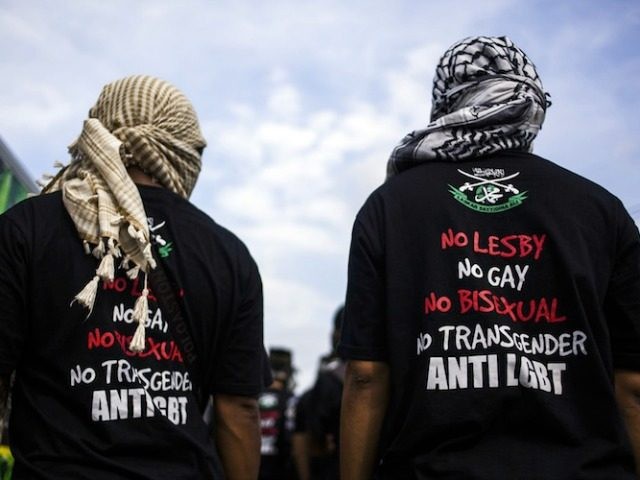Indonesia, the world’s most populous Muslim nation, has responded to criticisms in a new Human Rights Watch report by stating that the government will protect the rights of gay people, but there is “no room” for an LGBT “movement” in the country.
The government will not protect, the statement implies, the right to freely identify as an LGBT person.
“As a citizen, whoever the person is will have his rights protected, without looking at his sexual preference,” presidential spokesman Johan Budi told Reuters, “but if LGBT means a mass movement to influence other parties to become like them, then there’s no room here.”
The Human Rights Watch report condemned the Indonesian government for persecuting LGBT individuals under the excuse of enforcing Sharia, or Islamic law. Public officials have become increasingly vocal in objecting to individuals who identify publicly as gay, and the public anti-gay movement appears to have deeply affected the attitude of the average Indonesian, as the survey taken this month found that LGBT people are now the most hated in the country, even more than “communists” and “Jews.”
“It’s strange because usually it is the communists and the Jewish people who claim the top two spots as the most disliked groups by Muslims,” researcher Aryo Ardi Nugroho told The Jakarta Post, as quoted in Time magazine. Activists and non-political LGBT people alike told Time and Human Rights Watch that they now fear for their lives due to their identity. “I don’t feel safe with seeing all the ‘end LGBT’ statements on social media. I feel like a dog,” says one man quoted in the HRW report.
Indonesia is one of the few Muslim countries in which homosexuality is not explicitly illegal, though that may soon change; a group called the Family Love Alliance has taken the issue to court, arguing that a law against homosexuality is already on the books. Indonesia explicitly bars homosexual relations when one of the people involved is underaged.
The Indonesian government itself, not just individual officials, have taken action against what it has considered LGBT activism. “Gay” emojis on mobile phones are explicitly banned, and the government recently shut down a world-renowned school for transgender women after local Muslims accused the school of hosting “karaoke.”
The imposition of Sharia in Indonesia is not limited to LGBT individuals. Among the government punishments for Sharia violations this year have been the severe caning of an unmarried man and woman who were discovered in each other’s presence without a third party present, the similar caning of an elderly Christian woman for allegedly selling alcohol, and national outrage against a noodle snack marketed with the image of a woman wearing a bikini.
The caning of the Christian woman was the first known modern punishment of a non-Muslim in the country for violating Sharia law, though there have been growing signs of radicalization in the government before then. Last year, for example, Sharia activists succeeded in convincing the government to impose Sharia in public schools to all students, mandating the separation of the sexes, a strict dress code, and dietary and Quranic recital requirements.
As Indonesia is home to a large and fanatical Muslim population, the Islamic State (ISIS) has had designs on expanding its Caliphate into the southeast Asian nation for months. In December, Australian Attorney General George Brandis warned that the Islamic State has “ambitions to elevate its presence and level of activity in Indonesia, either directly or through surrogates.” A month later, Islamic State terrorists conducted multiple bombings in the nation’s capital, Jakarta, killing 17. An estimated 1,000 jihadists from the region have traveled to Iraq and Syria to join the war to establish the ISIS Caliphate there.

COMMENTS
Please let us know if you're having issues with commenting.